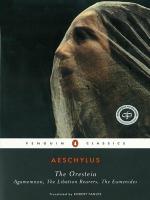|
|
The Libation Bearers Objects/Places
Argos: A city located on the Peloponnesian Peninsula in southern Greece. The Argive king Tantalus began a pattern of destruction for Argos after he offended the gods by feeding them his son Pelops at a banquet. King Pelops' sons continued this as Atreus cooked Thyestes' children, exiling him brother afterwards. Clytaemnestra murders Agamemnon later after he killed her daughter Iphigenia, thus continuing this cycle of death and jealousy for the royal house of Argos.
Trojan War: A war fought at Troy between the native Trojans and the invading Greeks. Started by Paris, who stole Menelaus' wife Helen, Menelaus asked his brother to help rescue her. Led by Agamemnon, the Greek army fought for ten long years, losing many brave warriors. The Greeks won after deceiving the Trojans into bringing a wooden horse into the city's walls, thinking that it was a peace offering. However, Greek soldiers hidden within later crawled out secretly, opening the city gates for the entire army to invade the city. Troy was burned to the ground, its adult males were slain, and its men and children were enslaved.
Troy: A city located in the eastern Mediterranean, in the country that is known as Turkey today. Ruled by Priam, Troy was besieged for ten long years during the Trojan War. The Greeks wanted to rescue the Greek Helen from the Trojan prince Paris, who had kidnapped her. Troy was finally defeated through deception, and the city was burned to the ground.
Tomb of Agamemnon: Final resting place of King Agamemnon in Argos, buried in an unmarked grave by his murderers Clytaemnestra and Aegisthus. Orestes returns to the tomb of Agamemnon after many years, leaving a lock of hair for his father's spirit as a present. Sent by Ckytaemnestra, Electra goes to the tomb with the Chorus to make holy libations that will appease Agamemnon's angry spirit. The two siblings are reunited here and immediately plan revenge against Clytaemnestra.
Inachus: The personification of the Inachus River in Greece. Inachus is the legendary divinity who founded the city of Argos. Orestes invokes his name when leaving a lock of hair at Agamemnon's tomb.
Libations: Liquid offerings of water or wine that are poured out to the gods in a religious ritual. Electra is pouring libations to appease Agamemnon's angry spirit when Orestes appears again after many years. Together, they decide what they shall wish for again when the libations are poured again. Rather than seeking forgiveness for what Clytaemnestra has done, now the only request that these libation bearers seek is merciless revenge for Agamemnon's murderers.
Oracle of Apollo: A prophesy sent directly from Apollo but voiced by human prophets. An oracle that Orestes heard stated that he would suffer intolerably because of Agamemnon's angry spirit if he failed to murder his mother, Clytaemnestra. The Trojan princess Cassandra made an earlier oracle that Orestes was destined to return to Argos and murder his mother.
Furies: Avenging goddesses that are older than Zeus' Olympian gods; born from the blood of Zeus' grandfather, the god Uranus, when Cronus castrated him. Punishing the worst of sins such as kindred bloodshed, the Furies are primal creatures that are feared by all people because they look so monstrous with the heads of women with snakes for hair. The Furies torment Orestes for murdering his own mother, causing him to flee Argos and seek help from Apollo at Delphi.
Lemnos: An island in the northeastern Mediterranean Sea. Lemnos was the site of a massive massacre when many jealous wives murdered their husbands because they had chosen to make love to other women they had captured in war. Clytaemnestra's murder of Agamemnon is compared to these Lemnian women, suggesting that women in general have a violent temper.
Phocis : A region of Greece north of Argos and west of Athens; site of Apollo's famous temple at Delphi. Orestes claims that he is from Phocis when disguised as a foreign traveler at the royal palace of Argos.
Robe: A piece of clothing used by Clytaemnestra to restrain Agamemnon's arms when he was in the bathtub. Saved for many years, Orestes displays the blood-stained robe again after murdering Clytaemnestra and Aegisthus as a symbol that revenge has been made for his father's death.
Pytho: Another word for the city of Delphi. Delphi is also called 'Pytho,' because this was the original name due to a great python snake that once controlled the city. Apollo slew this snake with his arrows, claiming the temple of the oracle for himself. Thereafter, Apollo was known as 'Pythian Apollo' in remembrance of the snake that he killed.




